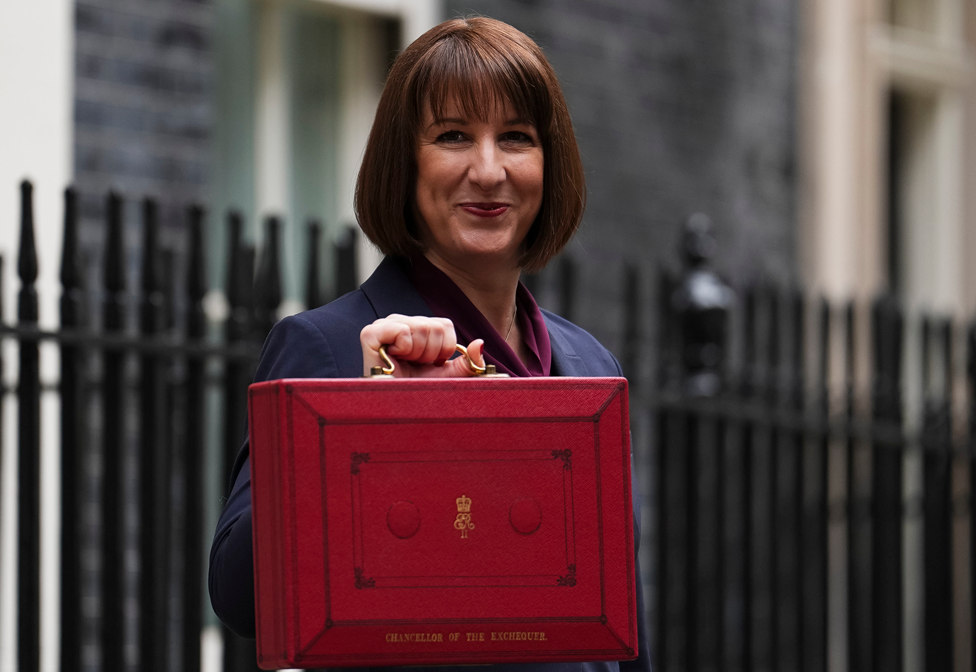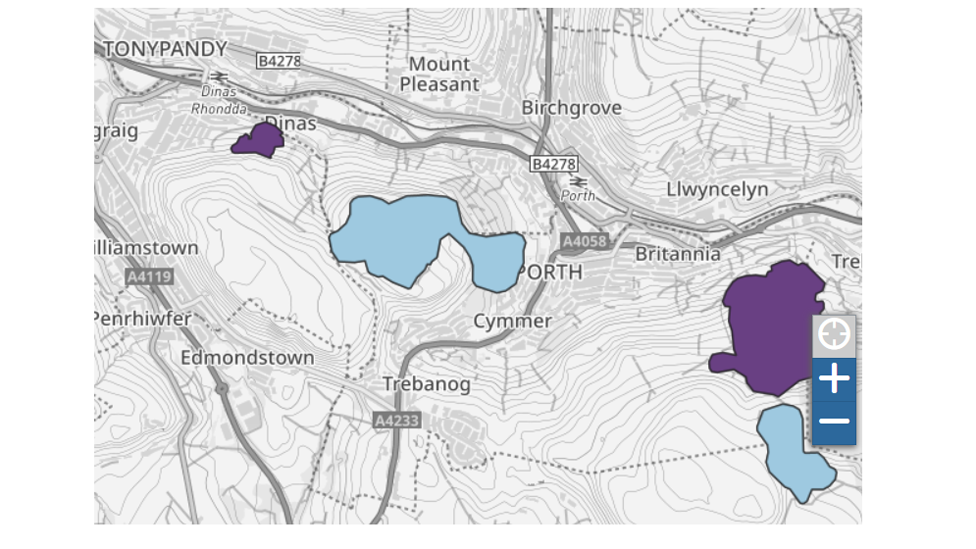Extra £1.7bn for Welsh government in UK Budget

Rachel Reeves left for the House of Commons to deliver her Budget after a long cabinet meeting
- Published
The Welsh government will receive an extra £1.7bn next April, in what the Labour chancellor called the "largest real-terms funding increase since devolution".
Rachel Reeves also announced £25m towards maintenance and safety measures for disused coal tips in Wales.
The UK government confirmed support for two electrolytic hydrogen projects in Wales, in Milford Haven and Bridgend, to support low carbon hydrogen production.
Welsh Secretary Jo Stevens said the Budget "shows the difference" made when "two governments work together". Welsh Conservatives called it a “smash and grab Budget" that would have a "devastating impact". Plaid Cymru said it fell short of "transformative change".
The additional £1.7bn for the Welsh government, due to extra spending in England next year on matters devolved to Wales, would enable "substantial investment" on "schools, housing, health and social care, and transport", according to UK ministers.
The £25m for coal tip safety measures comes after Welsh Finance Secretary, and ex-first minister, Mark Drakeford said over the weekend that he had been talking to the UK Treasury about the issue and was hopeful of progress.
There are more than 2,500 coal tips in Wales, including 360 deemed to be of highest risk from landslips in bad weather.
How the Budget will affect you and your money
- Published30 October 2024
Budget 2024: Key points at a glance
- Published30 October 2024
Five things to watch out for in the Budget for Wales
- Published30 October 2024
Analysis by BBC Wales political editor Gareth Lewis
£1.7bn of extra cash for the Welsh government is the biggest real terms funding increase in the history of devolution according to the chancellor.
Welsh ministers will decide how to spend it. Their number one priority is bringing down NHS waiting lists.
Will it make a difference? Those waiting lists are at record levels and last year the Welsh government made cuts elsewhere to funnel more than £400m into the health service.
Welsh councils are warning of a £559m budget gap in the next financial year.
£1.7bn soon starts to get eaten up.
As expected, we also saw the first contribution by a UK government - £25m - to help with making coal tips safe – although whether there is more to come depends on future negotiation.
Opposition parties are warning that NI increases will be “destructive” for small business and that reforms to inheritance tax threaten small Welsh family farms.
Today's announcement of coal tip safety money was being sold as proof of a "new relationship... based on cooperation, respect and delivery" between two Labour governments at either end of the M4.
But community groups and opposition party politicians are quick to point out that much more than £25m will be needed.
Ministers in Cardiff Bay have argued the problems pre-dated devolution and suggested it could cost between £500-£600m across Wales.

There are around 360 old coal tips which are monitored because they are at higher risk of developing issues
What else was included for Wales?
As well as funding towards coal tip safety, the Budget also included:
Support for two electrolytic hydrogen projects in Milford Haven and Bridgend to support low carbon hydrogen production and "directly create good quality, local jobs".
Designating tax sites in Celtic Freeport in Neath Port Talbot and Pembrokeshire, so businesses can benefit from tax reliefs on new investment and employment
Get Britain Working plans, which will include eight sites across England and Wales to support people who have had poor health back into employment.
The scrapping of a controversial arrangement that saw the government receive hundreds of millions of pounds from a pension scheme for ex-colliers, which around 18,000 former Welsh miners are expected to benefit from.
Funding worth £88m for continuing City and Growth Deals.
The wider announcements included an extra £465 a year for single pensioners and £710 a year more for couples on Pension Credit, which should benefit 80,000 pensioners in Wales.
More than 600,000 Welsh pensioners will get a 4.1% increase in their state pension from next April.
Around 1.1 million families in Wales will see their working-age benefits rise in line with inflation, worth £150 a year on average from next April.
The legal minimum wage for over-21s is to rise from £11.44 to £12.21 per hour from April.
The rate for 18 to 20-year-olds will go up from £8.60 to £10, as part of plans to move towards a "single adult rate".
There are an estimated 70,000 minimum wage workers in Wales.
Stevens hailed the "record boost to spending for the Welsh government to support public services like the NHS while thousands of working people across Wales will benefit from today’s increases to their wages".
She said: “Little more than a week after the anniversary of Aberfan disaster it is fitting that we have committed £25m to make coal tips safe.
"It is testament to the new relationship between the UK and Welsh government, based on cooperation, respect and delivery."
'Catastrophic' change
Reeves told MPs she was raising taxes by £40bn, with more than half of that sum coming from businesses.
From April, firms will pay National Insurance at 15% on salaries above £5,000, up from 13.8% on salaries above £9,100.
That will raise an additional £25bn a year.
However employment allowance - which allows smaller companies to reduce their NI liability - will increase from £5,000 to £10,500.
The National Farmers' Union called a change to inheritance tax "catastrophic" for family farmers.
From April 2026, the first £1m of combined business and agricultural assets will continue to attract no inheritance tax.
But for assets over £1m, inheritance tax will apply with a 50% relief, at an effective rate of 20%, the chancellor said.
Conservative Senedd leader Andrew RT Davies accused Reeves of presenting a "smash and grab Budget" that "will have a devastating impact in Wales".
"This Budget is built on the back of keeping pensioners cold this winter, and the National Insurance rise will be an incredibly destructive jobs tax for Wales’ economy which is already struggling after decades of Labour rule," he said.
Ben Lake, who speaks for Plaid Cymru on Treasury matters at Westminster, said: "Regrettably, the Budget falls short of the transformative change that was promised during the general election.
“Labour promised two governments working together, but it appears the Welsh government was sidelined yet again by the UK government, as there is little good news for Wales," he added.
The Welsh Liberal Democrats said the Budget failed to offer an ambitious vision for Wales that would mark a long-term investment in its future.
"It punishes small businesses and will be a disaster for family farms," they added.
The Welsh government will announce its detailed spending plans for 2025-26 on 10 December.